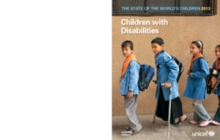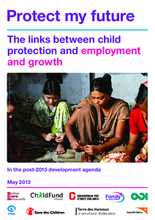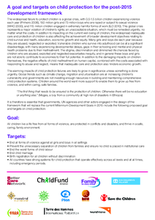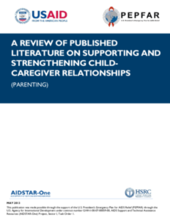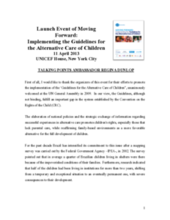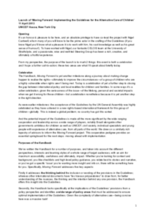Displaying 3691 - 3700 of 4424
Sans une mise en œuvre efficace, la Convention de La Haye en elle-même est impuissante pour prévenir les pratiques abusives dans le domaine de l’adoption internationale. Une bonne application de la CLH dépend de la volonté politique des Etats parties à travers des législations et des procédures adéquates et le renforcement des contrôles.
In this opinion piece, Daniela Papi writes about her personal experience as an international volunteer and how she came to realize the potential detrimental effects her volunteer work had on the communities with whom she worked.
In its 2013 State of the World’s Children Report, UNICEF has chosen to highlight the particular issues, needs, and circumstances of children with disabilities worldwide. The report includes a description of the common issues that children with disabilities face, models for inclusive policy and practice, and an agenda for action moving forward.
This paper was commissioned by Family for Every Child and is part of an inter-agency series on the links between child protection and major development goals. This report focuses on the links between child protection and economic growth.
This statement from a group of international and national agencies working towards children's protection include recommendations for the inclusion of a major goal and specific targets on children's care and protection as part of the framework that will replace the current Millennium Development Goals in 2015.
This paper presents a comprehensive literature review of evidence-based parenting programs from around the world. The report reviews published literature from 2000 to 2012 and summarizes empirically based recommendations for supporting and strengthening child-caregiver relationships in the context of AIDS and poverty.
This 5-minute animated video depicts a theory of change for achieving breakthrough outcomes for vulnerable children and families. It describes the need to focus on building the capabilities of caregivers and strengthening the communities that together form the environment of relationships essential to children’s lifelong learning, health, and behavior.
The International Day for Street Children was celebrated for the third year on April 12, 2013. The Consortium for Street Children wishes to have this day recognized by the UN. To lend your support, please sign the petition.
Statement by Ms. Regina Maria Cordeiro Deputy Permanent Representative of Brazil to the United Nations on the occasion of the launch of the handbook ‘Moving Forward: Implementing the ‘Guidelines for the Alternative Care of Children’ at UNICEF House in New York on the 11th April 2013
Statement by Ms. Jennifer Davidson, CELCIS & co-author of the Handbook on the occasion of the launch of the handbook ‘Moving Forward: Implementing the ‘Guidelines for the Alternative Care of Children’ at UNICEF House in New York on the 11th April 2013.

